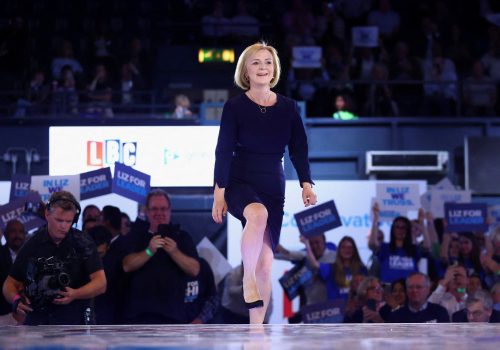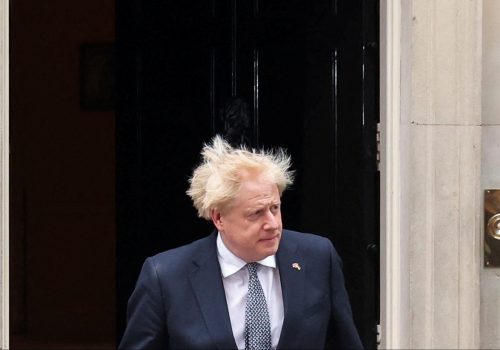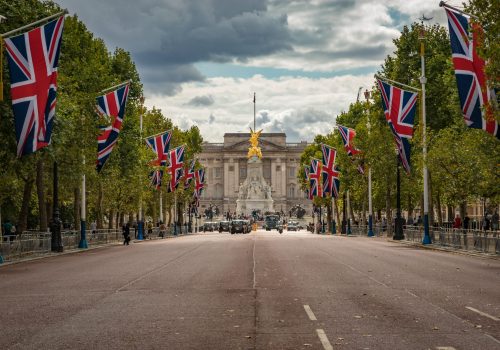What should the world expect from Liz Truss?
JUST IN
British Conservative Party members tapped Foreign Secretary Liz Truss to become the United Kingdom’s next prime minister today. But while she may be celebrating, Boris Johnson’s successor now confronts economic crises at home and an escalating diplomatic standoff with the European Union over the Irish border. As Truss maps out her priorities, our experts weigh in on what to expect from London under her leadership.
TODAY’S EXPERT REACTION COURTESY OF
- Peter Westmacott (@PeterWestmacott): Distinguished ambassadorial fellow at the Europe Center and a former British ambassador to the United States
- Ben Judah (@b_judah): Director of the Europe Center’s Transform Europe Initiative and veteran British journalist
- James Batchik: Assistant director at the Europe Center
- Livia Godaert (@liviagodaert): Nonresident fellow at the Europe Center
Domestic doldrums
- Peter tells us that Truss seized victory by throwing “plenty of red meat”—such as a promise to cut taxes—at the largely white, affluent, anti-European Conservative base that elected her party leader. But she might soon find less room for political posturing: “There may be a more considered approach,” Peter says, once Truss starts dealing with her country’s high inflation and energy shortages “and finds that she needs friends abroad.”
- A longtime political “chameleon,” Truss will likely “immediately shift her politics to fit the view from Downing Street, with talk of a $100 billion package to tackle the energy crisis,” Ben notes.
- For Truss to succeed, Ben adds, she will need to end the chameleon act and commit to “fixing her name to big, precise policies and sticking to them to face the magnitude of the crisis” facing the country.
All cool on the continent?
- The European Union, James says, will be watching to “see which version of Liz Truss it will get.” She’s occupied both sides of the Brexit debate in her political career. And now, “as prime minister, she finds herself at a crossroads with Europe again.”
- Truss has threatened to unilaterally withdraw from parts of the Northern Ireland Protocol, the post-Brexit agreement over the Irish border, with the EU preparing retaliation if she follows through on that threat. But James points out that as foreign secretary, Truss worked well with Europe on issues such as support for Ukraine.
- When it comes to the EU, Truss “may tread a middle ground, hoping to park but not resolve the Northern Ireland issue, or lean in on confrontation to score points at home and within her party,” James tells us. “Until then, expect relations with Brussels to be uncertain.”
- Adding to the uncertainty, Truss “made Britain’s allies wonder what’s coming” when she declined to say whether French President Emmanuel Macron was a friend or foe of the United Kingdom, Peter notes.
In for a pound
- As for the country’s standing in the world, its Global Britain initiative appears to be wavering just eighteen months after launch, Livia tells us, as economic woes and political scandals “have unsurprisingly pulled focus inward.”
- That means Truss’s foreign-policy vision will be focused on boosting the British economy, Livia predicts: “We are going to see a turn to economic diplomacy as the priority through the G7 and aggressive trade-partnership negotiations, as well as a re-think of the UK’s traditional partners on the world stage, continuing a process that began with Brexit.”
- “While she is committed to NATO, Truss is far less enthusiastic about partaking in broader European political processes,” Livia adds.
- On security, Peter points out Truss’s penchant for tough talk during the campaign: “She advises the Ukrainians not to give an inch to Vladimir Putin, while asserting that she will soon designate China a threat to UK national security.”
- In addition to those external challenges, Truss will be trying to keep the union together as Northern Ireland and Scotland threaten to break away, Livia notes. “The United Kingdom has the potential to facilitate transformational policy change through collaboration—with tech regulation representing one underappreciated area—but its allies and friends will need to put in the work to keep the new prime minister’s attention.”
Further reading
Mon, Sep 5, 2022
Experts react: The United Kingdom has a new prime minister. What should the world expect from Liz Truss?
Experts react By
How will Truss balance economic challenges at home and deal with allies and foes abroad? Our experts weigh in.
Thu, Jul 7, 2022
What does a post-Boris Britain look like?
Fast Thinking By
From both sides of the Atlantic, our experts weigh in on the next act for Great Britain.
Fri, Oct 8, 2021
Global Britain: An American review
Issue Brief By
What is happening to Britain in the world? Since 2016, when Brexit began with the United Kingdom’s shock “leave” vote to quit the European Union, the conversation has become almost impossible to have without entering into a fierce and polemical debate surrounding the country’s departure.
Image: Conservative leadership candidate Liz Truss takes part in a Q&A session during a hustings event, part of the Conservative party leadership campaign, in Birmingham, Britain August 23, 2022. REUTERS/Phil Noble


